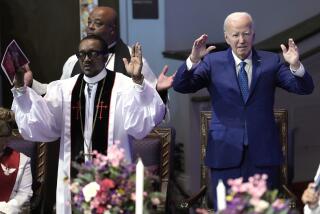Baptists Reject Call to Punish Clinton for Stand on Gays
SALT LAKE CITY — Southern Baptists ended their annual meeting Thursday by narrowly defeating a proposal calling on President Clinton’s Little Rock, Ark., church to discipline him if he refuses to rescind an executive order barring discrimination against gay federal employees.
The proposal, which won 48% of the votes cast, was put forward by Wiley Drake, pastor of First Southern Baptist Church of Buena Park, Calif., who last year led the convention’s move to boycott Walt Disney Co.
The resolution called on Clinton’s home church, Immanuel Baptist, to consider disciplinary action against him in light of a denominational rule that says churches are not “in cooperation” with the Southern Baptist Convention if they affirm homosexual behavior.
Instead, the convention adopted a resolution condemning homosexuality and asking Congress to nullify Clinton’s order barring discrimination in the federal workplace on the basis of sexual orientation.
“I believe that we need to take a strong stand because one of our Southern Baptist churches has the president of the United States going around the country saying he’s a Southern Baptist,” said Drake.
The last day of the meeting at the Salt Palace Convention Center, which was attended by 8,577 delegates, saw passage of several other resolutions.
One resolution opposed women in combat because “it rejects gender-based distinctions established by God in the order of creation” and “subordinates the combat readiness of American troops, and the national security of the United States, to the unbiblical social agenda of ideological feminism.”
The convention also adopted a resolution calling on Congress to stop “public funding of religious bigotry,” citing public funds for the play “Corpus Christi,” in which Jesus is depicted as having sex with his disciples, and the recent Public Broadcasting System documentary program on contemporary biblical scholarship, “From Jesus to Christ,” which was described as “an attack on biblical Christianity.”
More to Read
Sign up for Essential California
The most important California stories and recommendations in your inbox every morning.
You may occasionally receive promotional content from the Los Angeles Times.










